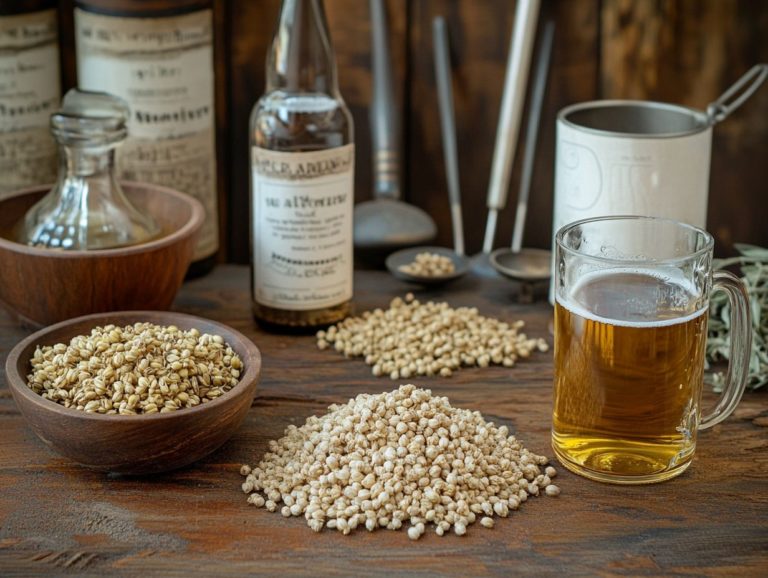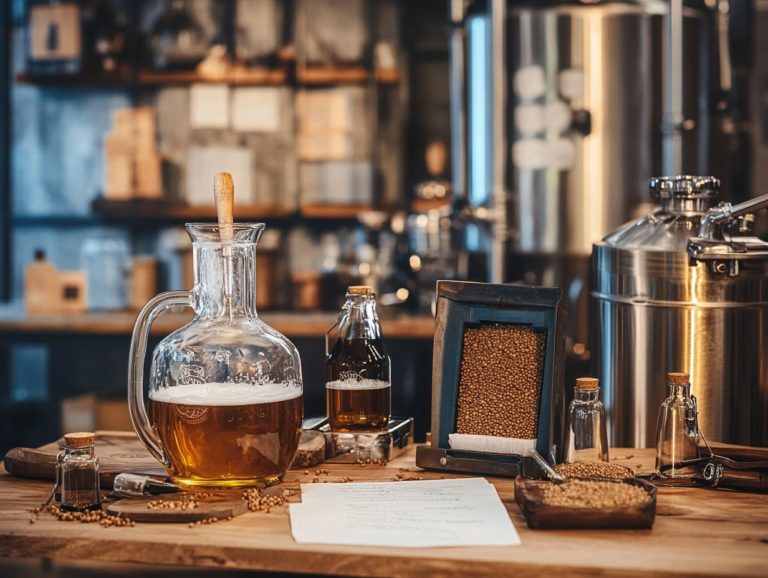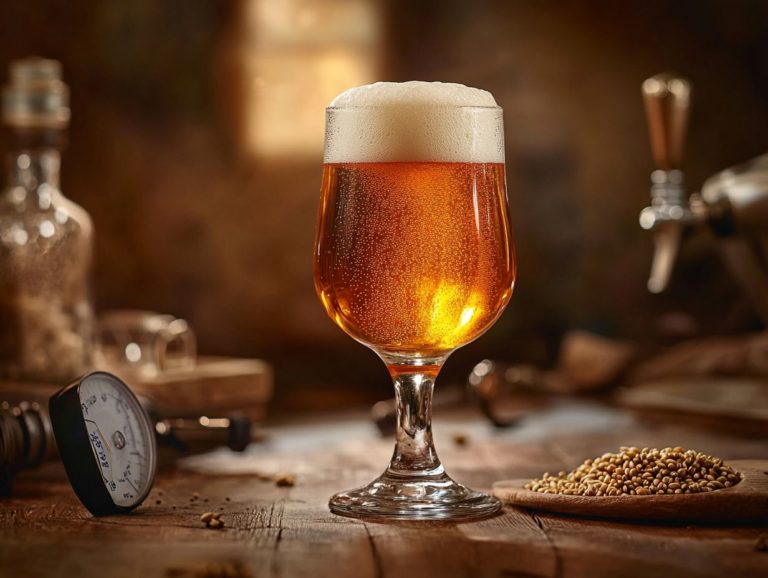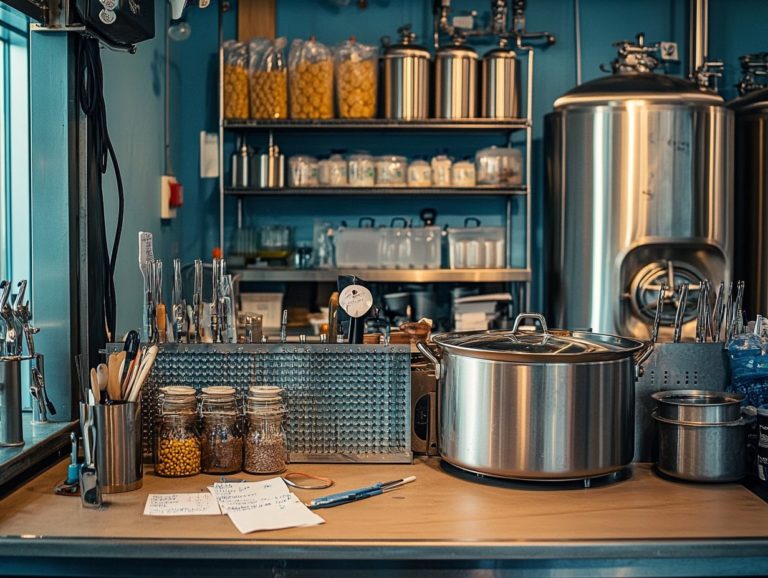How Do I Find Beer Recipes Online?
Are you ready to embark on an exciting brewing adventure but unsure where to uncover the perfect beer recipes? Dive in today and start brewing your masterpiece! The internet is a treasure trove of information, brimming with resources tailored for both novice and seasoned homebrewers alike.
You ll find an abundance of dedicated recipe websites, lively online forums, and engaging social media groups, each offering a myriad of options. This guide will lead you through various sources, recipe types, and invaluable tips for selecting and successfully crafting your own delightful beer at home.
Whether you re in search of classic flavors or daring new brews, your next favorite recipe is merely a click away!
Contents
- Key Takeaways:
- Where Can I Find Beer Recipes Online?
- What Are the Different Types of Beer Recipes Available Online?
- How to Choose the Right Beer Recipe for You?
- 1. Consider Your Brewing Experience
- 2. Think About Your Taste Preferences
- 3. Consider the Ingredients and Equipment You Have
- What Are the Steps to Follow When Using a Beer Recipe?
- 1. Gather All Necessary Ingredients and Equipment
- 2. Follow the Instructions Carefully
- 3. Monitor the Fermentation Process
- 4. Bottle and Age the Beer
- What Are Some Tips for Finding and Using Beer Recipes Online?
- 1. Read Reviews and Ratings
- 2. Experiment and Customize Recipes
- 3. Join Online Communities for Support and Advice
- Frequently Asked Questions
- Are there any websites that offer step-by-step instructions for brewing beer?
- Can I find beer recipes that use specific ingredients?
- Is it possible to find beer recipes for beginners?
- Are there any websites that allow users to submit their own beer recipes?
Key Takeaways:

- Browse beer recipe websites, homebrew forums, and social media groups for various options.
- Explore traditional, craft, clone, and novelty beer recipes available online.
- Select a recipe based on your experience, taste preferences, and available ingredients.
Where Can I Find Beer Recipes Online?
Discovering beer recipes online is a breeze with the abundance of resources available for both novice and seasoned homebrewers. You can explore dedicated websites like Brewtoad and HomeBrewTalk, or delve into specialized platforms such as BeerSmith and the American Homebrewing Association.
These sites offer an extensive catalog of beer recipes, brewing guides, and engaging community discussions tailored to your brewing journey. Online calculators and forums promote collaboration and knowledge-sharing among brewing enthusiasts, transforming the process into an invaluable resource for anyone eager to create their own distinctive brews.
1. Beer Recipe Websites
Beer recipe websites are a goldmine of information for homebrewers. They offer a collection of recipes organized by beer styles, including popular favorites like American Pale Ale and various craft beer options.
These platforms don’t just serve up a vast database of recipes; they also feature user reviews that provide invaluable insights from fellow enthusiasts. You can easily filter recipes according to BJCP styles, ensuring you find exactly what you need to craft your perfect brew.
With the addition of brewing software and recipe calculators, the process of recipe development and customization becomes a breeze. This allows you to fine-tune ingredients and measurements with remarkable precision. This technological support elevates your brewing experience, inspiring you to experiment and create unique concoctions that tantalize the taste buds.
By engaging with a community of passionate brewers, both novices and experienced brewers can share tips and refine their craft, enhancing their journey into the world of brewing.
2. Homebrew Forums
Homebrew forums serve as vibrant hubs where you can connect with fellow enthusiasts to exchange knowledge, share brewing tips, and seek advice on every facet of home brewing. This includes selecting the right equipment and mastering fermentation techniques.
These online communities are vital for fostering connections among both novice and seasoned brewers. They provide a supportive environment for discussing successes and challenges alike. You’ll find members sharing personal anecdotes that offer valuable insights, especially for beginners navigating the complexities of brewing.
Through these interactions, you can discover innovative recipes, troubleshoot fermentation issues, and optimize your brewing processes. Whether you’re in search of guidance on yeast selection or eager to delve into advanced methods like dry hopping, engaging in these forums creates an environment of collaboration and continuous learning.
This experience not only enhances your skills but also deepens your passion for the craft.
3. Social Media Groups
Social media groups dedicated to home brewing offer you an interactive haven where you can share your brewing experiences, post insightful beer reviews, and dive into discussions about the latest innovations and trends in the craft beer industry.
Platforms like Facebook and Instagram buzz with activity, as enthusiasts of all skill levels exchange valuable tips, delectable recipes, and stunning photos of their latest creations. You ll often come across users showcasing their brews with vibrant images that highlight unique flavors and clever brewing techniques, all while cleverly employing hashtags to connect with a wider audience.
The community-driven discussions foster a collaborative atmosphere, inviting you to seek advice on troubleshooting issues or garner suggestions for flavor pairings. Through live videos, virtual tastings, and engaging Q&A sessions, you can participate in real-time interactions, enhancing the sense of camaraderie that binds the homebrew community together as you navigate the thrilling world of craft beer side by side.
What Are the Different Types of Beer Recipes Available Online?
In the vibrant realm of home brewing, you’ll uncover an exciting world of beer recipes designed to cater to your unique preferences and brewing techniques. Whether you re drawn to the simplicity of traditional extract recipes or ready to tackle the complexities of all-grain brewing a method that involves using whole grains instead of malt extract that challenge even the most seasoned enthusiasts, there’s something for everyone.
Homebrew recipes can be elegantly categorized into numerous beer styles, featuring popular selections like American Pale Ale alongside specialty concoctions that are perfect for competitions. You can delve into clone beer recipes that replicate your favorite commercial brews or explore novelty recipes, where unique flavors and styles invite you to push the boundaries of your creativity.
1. Traditional Beer Recipes
Traditional beer recipes embody the rich heritage of brewing, using historical techniques and authentic ingredients to create timeless favorites that resonate with your passion for craft beer.
These recipes often rely on locally sourced malted barley, hops, yeast, and water, each contributing significantly to the beer’s unique character. The careful steps of mashing, boiling, and fermentation create unique flavors that elevate your tasting experience. Iconic styles like Pilsner, Porter, and Saison demonstrate how traditional methods shape texture, aroma, and taste.
For instance, the use of noble hops in a classic German Pilsner delivers a delightful bitterness complemented by floral notes, while the fermentation techniques used in a Belgian Saison produce fruity esters and a crisp, dry finish.
By adhering to tradition, you not only honor the brewing legacy but also inspire innovative interpretations within the vibrant craft beer community.
2. Craft Beer Recipes

Craft beer recipes represent the pinnacle of innovation in the brewing industry, bringing together unique hop varieties and unconventional fermentation methods to create flavors and aromas that cater to your discerning palate.
These recipes invite you to delve into a world of creativity, where you can experiment with exotic fruits like passionfruit and guava or add spices such as coriander and ginger to your brews. Innovative techniques, including barrel-aging and wild fermentation, elevate the complexity of flavors, allowing you to experience the full spectrum of what craft beer can offer.
Popular styles like IPAs, stouts, and sour ales demonstrate how diverse ingredients can yield remarkable results. Experimentation is the lifeblood of home brewing, giving you the power to refine your creations and push the boundaries of taste.
In the end, each beverage you craft tells a unique story with every sip. Now it’s your turn dive into the world of home brewing and create your masterpiece!
3. Clone Beer Recipes
Clone beer recipes empower you to replicate your favorite commercial brews. This transformation turns homebrewing into a fun and rewarding adventure that deepens your understanding of the brewing process behind those beloved beers.
These recipes simplify the complexities of brewing. They offer detailed guidelines that encompass everything from choosing the right malt to selecting the right hops and yeast for an authentic flavor. Whether you’re aiming to craft a crisp lager or a rich stout, explore various techniques, such as partial mash brewing or all-grain methods, each presenting its own unique advantages.
The vibrant brewing community plays a pivotal role in your journey. Many enthusiasts share their personal adaptations and insights on forums and social media. This encourages peer reviews and constructive feedback, creating a collaborative environment that stimulates creativity and fosters a deeper appreciation for the art and science of beer making.
4. Novelty Beer Recipes
Novelty beer recipes invite you to embark on an adventurous brewing journey that encourages you to experiment with unconventional ingredients and flavors. This exploration lets you break the mold and often results in unique concoctions that can shine in competitions.
Incorporating innovative components like exotic fruits, herbs, and spices has become a hallmark of home brewers looking to set themselves apart. Imagine using flavors such as hibiscus, ghost peppers, or even barrel-aged spirits; these choices can lead to distinctive taste profiles that wow judges and excite fellow beer enthusiasts at festivals.
These distinctive brews challenge traditional beer styles. They also foster a sense of community among brewers who eagerly share their experimental successes and occasional missteps. The ongoing pursuit of novelty creates a vibrant brewing environment, inspiring you to explore limitless possibilities and ultimately enriching both the craft and competitive landscape, particularly in homebrew competitions.
How to Choose the Right Beer Recipe for You?
Selecting the right beer recipe is crucial for a rewarding brewing experience, requiring careful consideration of several factors. Reflect on your brewing experience level, your personal taste preferences, and the ingredients and equipment available to you, including any specific brewing tools you might need.
If you re just starting out, simpler extract recipes may be the ideal entry point. More seasoned brewers can venture into all-grain recipes or craft beer styles that embody their distinctive tastes, such as American Pale Ale.
1. Consider Your Brewing Experience
When selecting a beer recipe, it s essential to consider your brewing experience. This will guide you in choosing between simpler extract recipes and more complex all-grain recipes that demand advanced techniques and equipment.
If you re just starting out, sticking to extract recipes can build your confidence. They help you familiarize yourself with the brewing process without the steep learning curve that all-grain methods often entail. These straightforward recipes allow you to concentrate on mastering fermentation and flavoring, all while avoiding the overwhelming details of mash temperature and grain selection. Utilizing brewing guides can also be immensely helpful.
Conversely, if you re a seasoned brewer, you may find that all-grain recipes suit your skills better. They offer a canvas for creativity and the chance to craft custom flavor profiles. No matter which path you choose, pairing your recipe with the appropriate brewing equipment and resources, such as brewing software like BeerSmith, will elevate your overall brewing experience.
Now it s your turn! Experiment with different recipes and share your creations. Join the community and see where your brewing journey takes you!
2. Think About Your Taste Preferences
Your taste preferences are pivotal when it comes to selecting the perfect beer recipe, as the vast array of beer styles allows you to customize your brewing experience to align with your unique palate. For a well-rounded understanding, consulting a beer styles guide can be beneficial.
Grasping the nuances of different beer styles like the bold bitterness of hoppy IPAs or the rich, roasted flavors of smooth stouts is essential in guiding your choices. For example, if you savor the crispness of lagers, you might gravitate towards recipes featuring Pilsner or Vienna malt. Conversely, if you delight in fruity or aromatic brews, exploring the world of Belgian ales or wheat beers could bring you immense satisfaction. Reviewing online beer reviews can provide insights into new styles you might enjoy.
It’s also vital to consider the balance of flavors, texture, and aroma, enabling you to craft unique beverages that truly reflect your tastes. Try out different ingredients and methods to enrich your brewing journey and lead to delicious discoveries that will undoubtedly please your taste buds. Don’t hesitate to use a recipe calculator to fine-tune your ingredients for the perfect balance.
3. Consider the Ingredients and Equipment You Have
Before you finalize a beer recipe, it s vital to evaluate the ingredients and brewing equipment at your disposal, as this will significantly influence which recipes are feasible and the techniques you can employ. Consulting brewing forums like HomeBrewTalk can provide additional insights and advice.
Taking stock of your specific hops, malts, yeast strains, and brewing vessels is paramount for achieving brewing success. Understanding the constraints of your inventory will guide you toward a recipe that not only fits your available resources but also aligns with your brewing aspirations. Using brewing tools such as a gravity calculator can help ensure precise measurements.
Recipe calculators are invaluable tools in this assessment process, enabling you to make quick adjustments based on what you have. By entering your current inventory into these calculators, you can seamlessly explore alternative recipes and variations, embracing the resourcefulness that is essential in homebrewing. This method not only maximizes your existing supplies but also fosters an environment ripe for experimentation and creativity. Many homebrewers share their findings on platforms like Brewtoad, further enriching the brewing community.
What Are the Steps to Follow When Using a Beer Recipe?

When you embark on your home brewing journey, following a clear set of steps is crucial for your brewing success! From gathering all the necessary ingredients and equipment to meticulously monitoring the fermentation process, each phase demands your careful attention to detail. Consider enrolling in brewing courses or attending brewing workshops to hone your skills.
As you bottle and age your beer, remember that adherence to brewing techniques is crucial for achieving the perfect brew.
1. Gather All Necessary Ingredients and Equipment
The first step in embarking on your brewing journey is to gather all the necessary ingredients and equipment. This includes malt, hops, yeast, and essential tools like brewing thermometers and hydrometers that will guide you through the home brewing process. Consulting brewing supply stores can help ensure you have all the necessary components.
This meticulous preparation is crucial; overlooking even a single item could jeopardize the quality of your final product. A detailed and accurate ingredient list not only helps you avoid miscalculations but also paves the way for a smoother brewing experience.
Choosing the right brewing equipment such as fermenters, brew kettles, and chilling systems is vital for achieving optimal fermentation and flavor extraction. Investing in high-quality brewing supplies is often recommended by experienced brewers.
Each piece of equipment contributes to the overall brewing process, significantly influencing the taste, aroma, and clarity of your beer. Therefore, dedicating time to preparation is not just a wise choice; it is fundamental to your success in home brewing.
2. Follow the Instructions Carefully
Following the instructions in your beer recipe is essential for achieving the results you desire. Even minor deviations can dramatically affect the flavor, fermentation, and overall quality of your brew. Experienced brewers often emphasize the importance of recipe development and strict adherence to brewing techniques.
When brewing beer, it’s vital to adhere to precise measurements and timing. These elements are key to avoiding inconsistencies or less-than-ideal outcomes. For example, if you don t maintain the fermentation temperature within the specified ranges, you might end up with off-flavors or stalled fermentation. Accurately measuring your ingredients is crucial to preserving the balance of hops, malt, and yeast, which is fundamental for achieving the intended taste profile.
Embrace best practices by double-checking your measurements. Maintain a clean, organized brewing environment to prevent contamination. Following the recipe closely enhances your brewing adventure and leads to a more successful and rewarding end product.
3. Monitor the Fermentation Process
Monitoring the fermentation process is an essential step in your home brewing journey. It allows you to track the progress of your beer and ensure that everything is fermenting as it should. Using brewing software like Brewgr can help you keep detailed logs during this phase.
By carefully observing key indicators, such as airlock activity and the development of krausen (the foam produced during fermentation), you can gather valuable insights into the health of your yeast and identify if any adjustments are necessary. Temperature control is paramount during this stage. Keeping the ideal temperature range for your specific yeast strain can significantly impact the flavor profiles and overall success of your brew. A yeast pitch calculator helps you determine the optimal amount of yeast needed.
Regularly taking specific gravity measurements will help you determine when fermentation has reached completion. Staying vigilant during this phase not only prevents unwanted off-flavors but also elevates the quality of your final product. This ensures that every element of your brewing process comes together in perfect harmony.
4. Bottle and Age the Beer
Once fermentation reaches its successful conclusion, you ll find that putting beer into bottles and letting it mature are pivotal moments in the home brewing journey. These steps allow the flavors to meld and evolve, setting the stage for that coveted final tasting. Utilizing a beer name generator can add a fun and personal touch to your bottled creations.
As you embark on the bottling phase, prioritize optimal sanitation practices to ensure that no unwelcome bacteria or wild yeast make an appearance in your masterpiece. This means meticulously cleaning and sanitizing all your equipment bottles, caps, and siphoning devices included to create a pristine environment for your brew.
Proper sealing techniques are equally vital. Using tight-fitting caps or corks will keep oxygen at bay, protecting your brew from spoilage. Don t miss the chance to perfect your brew during the aging process this is where the magic happens! As your beer matures, various flavor compounds interact and harmonize, resulting in a smoother, more robust profile. This complexity is what every home brewer yearns for in their craft, and you re on the path to achieving it.
What Are Some Tips for Finding and Using Beer Recipes Online?
Finding and utilizing beer recipes online effectively demands a strategic approach that marries thorough research with practical execution. This ensures that your brewing experiences are nothing short of successful. Platforms like the American Homebrewing Association offer a valuable recipe database.
By leveraging an array of brewing resources, such as online calculators and insightful beer reviews, you can elevate your brewing skills while sparking creativity in your recipe choices. Engaging in brewing discussions on sites like HomeBrewTalk can also provide new ideas and feedback.
We encourage you to share your brewing experiences or ask questions, fostering community engagement and further enhancing your home brewing journey.
1. Read Reviews and Ratings
Reading reviews and ratings from fellow homebrewers is a fantastic way to assess the quality and effectiveness of a beer recipe before you dive in. Sites like Brewtoad and HomeBrewTalk offer extensive beer reviews and insights.
By exploring insights shared by others, you can develop a clearer understanding of how various ingredients interact and influence the final product. This community-driven feedback is invaluable; it offers practical advice that can refine your brewing techniques and highlight potential pitfalls along the way.
Joining a homebrew community can provide you with valuable brewing tips and tools that can elevate your craft. Experienced brewers often share personal anecdotes about their adaptations or variations, inspiring you to experiment with confidence.
Since each homebrewer’s palate and brewing process varies, considering a diverse range of reviews, including those from brewing competitions and beer festivals, empowers you to make more informed choices. Ultimately, these shared experiences cultivate a sense of community and significantly increase your chances of crafting a truly exceptional brew.
Dive into brewing courses and workshops to expand your knowledge and skills!
2. Experiment and Customize Recipes

Experimenting and customizing beer recipes allows you to create unique brews that truly reflect your personal taste and creativity. You’ll have the opportunity to explore new flavors and innovative brewing techniques.
By layering different hops, grains, and additional ingredients used in brewing, you can craft distinctive profiles that surprise your palate and serve as a canvas for your self-expression. This adventurous spirit in brewing invites you to go beyond traditional styles like American Pale Ale and embrace your own preferences.
Through customization, you can fine-tune the bitterness, aroma, and mouthfeel of your creations, transforming each batch into an exciting new experience. Whether you choose to experiment with exotic ingredients or diverse fermentation methods, every decision adds complexity, unlocking a world of endless possibilities in homebrewing.
Consider using brewing software or a recipe calculator to perfect your recipes.
3. Join Online Communities for Support and Advice
Joining online communities dedicated to homebrewing offers you unparalleled support and advice. These platforms serve as vibrant spaces for sharing experiences and connecting with fellow enthusiasts.
Websites like BeerSmith and Brewtoad are excellent places to start. These virtual spaces are perfect for both novice brewers and seasoned experts, providing opportunities to learn from a diverse array of experiences and techniques.
By engaging in brewing discussions, you can uncover valuable insights into everything from ingredient selection to brewing methods, enhancing your skills and expanding your knowledge. You can also access brewing forums and equipment reviews.
These communities foster the exchange of ideas, leading to innovative recipes and inventive brewing solutions. Connecting with others who share your passion for crafting unique beers boosts your confidence and nurtures a sense of belonging.
Embracing these interactions elevates your brewing journey into a collaborative adventure, rich with creativity and camaraderie. Through brewing projects and innovations, your brewing experience will be significantly enriched.
Frequently Asked Questions
How do I find beer recipes online?
Use search engines like Google to discover countless beer recipes. You can visit websites that specialize in beer brewing, such as BeerAdvocate or the American Homebrewing Association, which have extensive recipe databases.
Sites like Brewgr or Brewtoad are valuable resources for discovering new recipes.
Can I find beer recipes specific to a certain type or style?
Yes, you can find beer recipes specific to a certain type or style. Many websites and forums have categories for different beer styles, making it easy to search for recipes for specific types of beer.
Utilizing a beer styles guide can also help you navigate these categories more efficiently.
Ready to brew your own beer? Join the community and start experimenting today!
Are there any websites that offer step-by-step instructions for brewing beer?
Yes, many websites provide step-by-step instructions for brewing beer.
Popular options include the Homebrewers Association, Craft Beer & Brewing, and Brew Your Own.
Can I find beer recipes that use specific ingredients?
Yes, you can find beer recipes using specific ingredients like hops, malt, or yeast.
Some websites offer advanced search options to filter recipes by ingredients.
Is it possible to find beer recipes for beginners?
Yes, many beer recipes cater to beginners.
Look for sites with sections dedicated to beginner-friendly recipes.
Are there any websites that allow users to submit their own beer recipes?
Yes, some websites let users submit their own beer recipes.
This is a fantastic way to discover unique and creative recipes from fellow homebrewers!
Don t miss out on the chance to craft something extraordinary from the innovative recipes shared by passionate homebrewers!
Make sure to read reviews and ratings before trying out a new recipe! Additionally, platforms like Brewtoad and HomeBrewTalk are great for user-submitted recipes.






